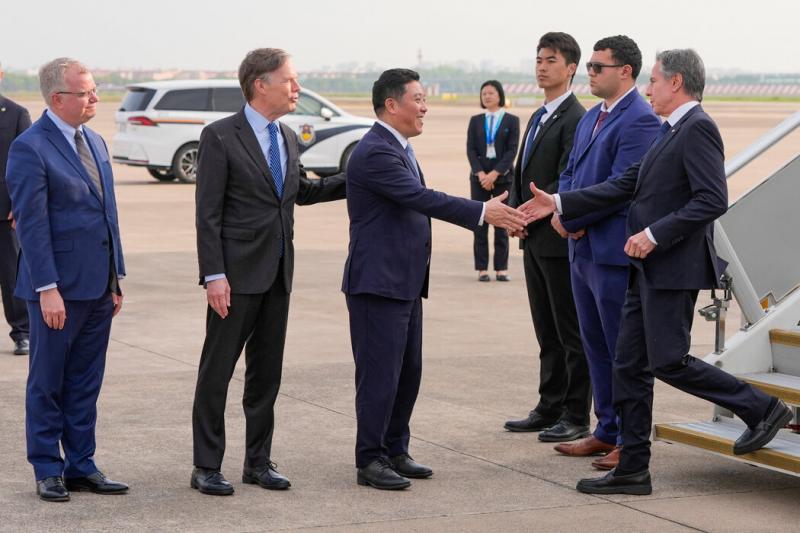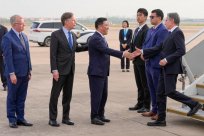
U.S. Secretary of State Brills arrived in China on Wednesday. When the tension of trade, territorial disputes and national security may once again disrupt the relationship between the two countries, trying to maintain the fragile and stable recently achieved by US -China relations.
Even the plane that Brinken had not landed in Shanghai, and his challenge had already appeared.A few hours ago, the US Senate passed a bill, and President Biden was expected to sign it as a law soon. The bill will provide $ 8 billion in military assistance for Taiwan and the Pacific region of India, which may lead to prohibited across the United States.Chinese mobile phone application Tiktok.
The complexity brought by the political season in the United States is also approaching slowly.As the presidential election approaches, Democrats and Republicans are scrambling to show a tougher attitude towards China.If the former President Trump was elected again, he might completely change the efforts of the two governments to stabilize bilateral relations.
A senior official of the US State Department told reporters at the telephone briefing that Brinken's visit to China for three days, and the itinerary will also include visiting Beijing.Russian issues support, U.S. officials' so -called low -cost export product issues that threaten the US employment, and the provocative behavior of Chinese ships in the South China Sea.
Chinese officials are likely to ask the United States to support Taiwan, as well as the US trade restrictions (the Chinese government calls discrimination).
Brinken is expected to meet with Chinese Foreign Minister Wang Yi.It is unclear whether he will meet with Chinese seniors. Brincken's last visit to China last year was last June.
That interview was the first visit to China since the US Secretary of State in 2018. The timing of the visit may be the worst moment of US -China relations in recent years.At that time, China and the United States had cut off the high -level military exchanges, making neighboring countries worry that the two countries might have an inadvertent war.
After, bilateral relations have eased.China's economic development is slowing down. In order to attract foreign capital, it adopts a gentle diplomatic tone.Although the U.S. government continued to warn that China threatened global security, it also said that it would be unblocked by maintaining communication channels.
Last November held a four -hour meeting near San Francisco.After that, China agreed to restore its cooperation with the United States in combating the global Fantnen production, and the two countries also affirmed the importance of restoring cultural exchanges.The leaders of the two countries also called this month.
Last week, the defense director of the two countries held a video conference, which was the first substantial contact of the military's military since the end of 2022.
But new problems that have exacerbated tensions have also appeared.Officials in Western countries have expressed more and more concerns about China ’s concerns about Russia in Russia.U.S. Financial Minister Yellen warned during his visit to China earlier this month that if Chinese companies provide substantial support to Russia, they will face "significant consequences."China has denied it and is also deepening Sino -Russian relations.President Putin is expected to visit China soon.
U.S. officials also said that China is dumping cheap electric vehicles and solar panels in overseas markets, harming the interests of American companies.China denies these allegations to call it a trade protectionism.
The provocative behavior of Chinese vessels in the disputed waters in the Philippines and Japan has also caused people to worry about conflict. Once conflicts occur, the United States may be involved because both countries are the United States Treaty Allies.
Taiwan may be the most sensitive issue in US -China relations. Taiwan's elected president Lai Qingde will take office next month. China rebuked him to advocate Taiwan independence.
Wang Wenbin, a spokesman for the Chinese Ministry of Foreign Affairs, was asked at a regular press conference on Wednesday when asked about the newly adopted Taiwan aid bill of Congress that Meitai strengthened its military cooperation "will not bring security to Taiwan."Taiwan Strait is tight. "
According to Chinese official media reports, the Chinese Defense Minister Dong Jun told the US Minister of Defense Austin in a video call that the issue of Taiwan is the core interest of China and "never tolerate it."
Wang Wenbin refused to answer questions about TIKTOK that reporters had repeatedly raised on Wednesday.He asked the reporter to read the previous statement of the Ministry of Commerce of China, and the ministry had stated that "resolutely opposed" selling the application.
In the United States, as the two parties compete for relatively tough, anti -Chinese remarks may intensify, and attitude towards China is one of the few areas with consistent opinions between the two parties.Bayeng called for a campaign to improve the imported Chinese steel and steel when he held a campaign in Pennsylvania, Pennsylvania, Pennsylvania.
"We had high hopes for the development of the San Francisco Summit, but the recent development development brought a lot of pressure on the relationship between the two countries," said Xie Tao, Dean of the International Relations College of Beijing University of Foreign Languages."Adding all these negative situations together is what people see is the current frustrating Sino -US relations."
Both countries have reasons to try to prevent tension from upgrading.The United States has demanded that China helps to stop Iran (the country has a good relationship with China) to push its hostility with Israel to a comprehensive war.China must strive to prevent the United States from further raising tariffs, because strong exports have helped offset the problem of weak domestic real estate crisis and weak consumption expenditure.
But neither of the two countries may not have much diplomatic room, because public opinion on both sides has become tough.
"There are many stimulus factors and distrust in the relations between the two countries," said Allen Kalson, a professor of international relations at Cornell University.
"It's like a pot of water that is about to boil, it will be boiled just one or twice."




